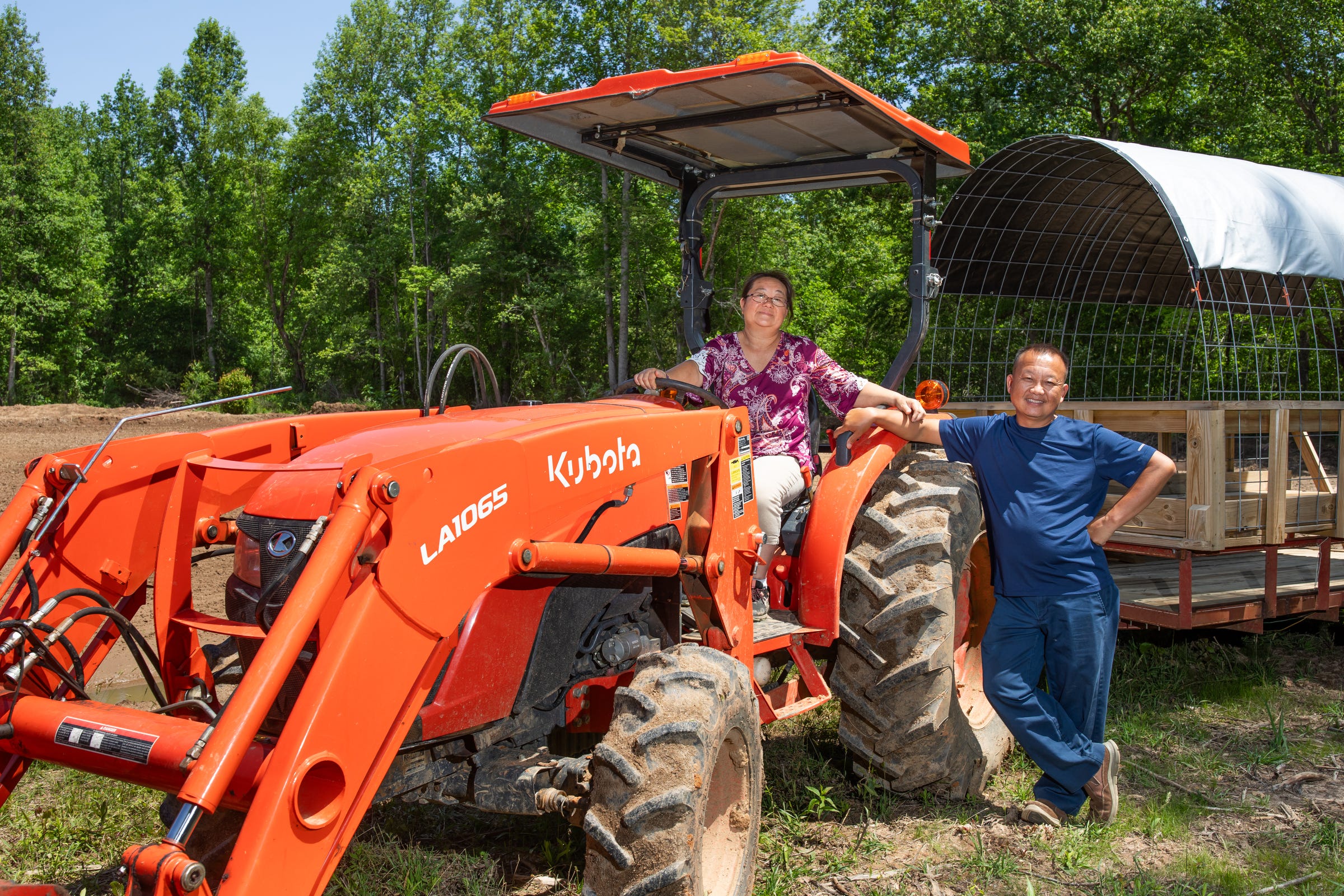These Local Farmers Have an Answer for Western NC's Agricultural Crisis
A Hmong farming family in the NC foothills leverages traditional agricultural practices to fight local farmland loss while mentoring new farmers through Oak Hill Community Farm's incubator program.
BURKE COUNTY, North Carolina—More than 13 years ago, Tou and Cheu Lee observed an interesting agricultural dynamic among the North Carolina foothills region’s sizable Hmong community. Many households were growing specialty produce and heirloom vegetables, but selling it almost exclusively to the large network of refugee Hmong families who started relocating here from Southeast Asia in the 1980s.
The rest of the foothills were missing out on fresh food that Hmong highlanders have traditionally grown using sustainable agricultural practices. Their approach contrasts with mass-scale farming that relies on synthetic herbicides and pesticides that undermine long-term soil health and threaten local ecosystems.
Taking notice of this, the couple started Lee’s One Fortune Farm to bring not only Asian rice and heirloom vegetables to the broader foothills region but knowledge about local food production, as well.
“[It’s] the foundation of all strong civilizations,” Tou Lee explains. “Having locally grown food is much healthier and allows all of us to eat products that are seasonal rather than the packaged produce found in supermarkets. You can visit and talk with your farmer and know what goes into the food you are eating. That is very important.”
When they expanded into the Asheville market, they may not have fully realized the foresight in their initial observation.
Despite being a mostly rural region, the foothills face a shortage of sustainable, locally grown food. Locals are staring at a pending crisis as agricultural lands are being swallowed up by development and other uses. This hollowing out of community-supported agriculture is mirrored across North Carolina.
According to the 2022 USDA Census of Agriculture, the Tarheel State lost 3,601 farms and 302,386 acres of farmland to some other land use type from 2017 to 2022. In fact, North Carolina ranks second in the U.S. for potential farmland loss by 2040, projecting 1.1 million acres of farmland being lost to other uses, per the American Farmland Trust’s “Farms Under Threat 2040” report.
The Foothills Conservancy of North Carolina (FCNC)—a Morganton-based nonprofit dedicated to protecting the region's ecosystems—was plenty aware of this situation when it acquired several hundred acres of land that would become the Oak Hill Community Park and Forest, located just three miles west of Freedom High School.
“We knew we needed to do something meaningful and productive with the almost 50 acres of prime farmland that exists in the bottomlands of the property along Canoe Creek,” says FCNC Stewardship Director Ryan Sparks. “The early conversations we would have amongst staff usually kept circling back to finding a way to use the fields to grow healthy food to feed people in our community.”
The problem isn’t only a shortage of suitable land, however. Many would-be farmers lack the knowledge and skills to fully engage in community-supported agriculture. The FCNC dreamed up a way to address both, all while increasing access for new and financially disadvantaged farmers: the Oak Hill Community Farm.
Set to launch early this year, it will feature an incubator program to support farmers, provide access to land and markets, and promote farm careers.
The Oak Hill Community Farm will also maintain “an accessible orchard and garden to educate people of all ages and abilities, including people with cognitive and physical limitations, about the benefits of local food,” Sparks continues. “Unique crops, like Asian rice and heirloom produce, will be grown and featured through workshops to teach others how to grow and prepare their own food to promote healthy habits.”
Incubator program participants are expected to “have a professional farming background or education and should already be engaged in the business of farming, no matter how big or how small,” he says. They will be given half an acre each for food production with yearly renewals until they can lease or purchase agricultural land elsewhere. Participants must also abide by sustainable farming practices. That means avoiding synthetic herbicides and pesticides, using cover crops, and composting and mulching to improve soil quality.
Currently leasing land at Oak Hill, the Lees have committed to mentoring those involved in the incubator program. From their knowledge of growing food using only natural inputs to their deep understanding of local markets and produce outlets, they will impart lessons learned from years of operating a successful farm business.
“The Lees will provide valuable insight, guidance, and encouragement as the participants work towards making their farm dreams a reality,” Sparks says.
Certainly, the incubator program will enable the Lees to expand their food production operations, in addition to their acreage elsewhere in Burke, Catawba, Caldwell, and McDowell counties, but they’re keeping the long-term perspective front of mind, as well. They want to encourage young people to embrace farming and the joy that comes from “working the ground with their hands,” Tou says, hoping it will help them understand the importance of ensuring agricultural land is always available to feed the local community.
“With the advent of farms being lost to commercial developers and large companies or groups buying up farmland and not allowing farming to occur, our idea is to make sure the community is on the farmer's side and to be their strongest advocate for keeping land available for local farmers. Once our local farms are lost, we will be under the subjugation of the powers that be and our families and community will suffer.”





The Lees are so involved here. A great example to the rest of us.